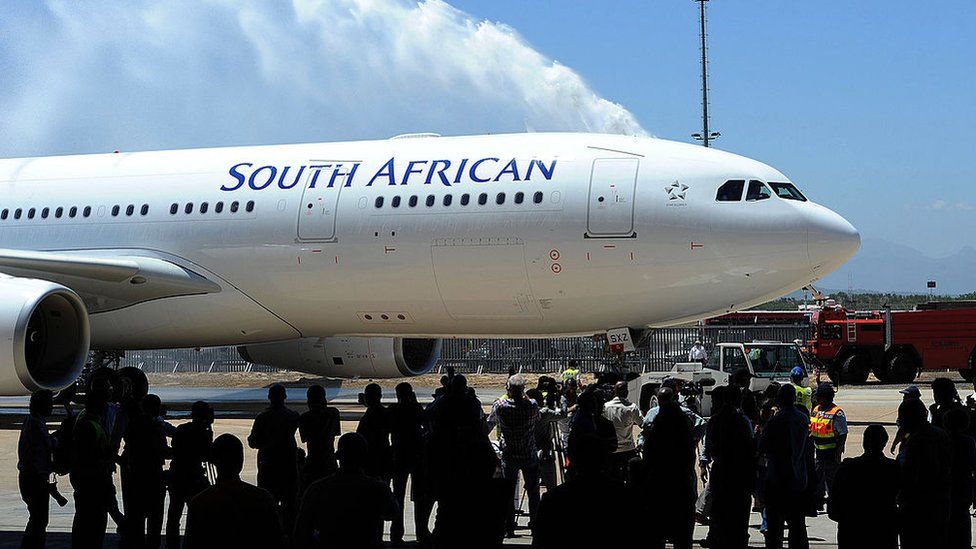-

-
-
Loading

Loading

South African Airways (SAA) is making a comeback in the intercontinental market, but doubts linger about its financial stability. The airline, once a prominent player in African aviation, vanished from the skies in September 2020 due to a combination of Covid-19 and the corruption and mismanagement that have plagued state-run carriers. SAA may soon be sold to a private consortium that would hold a majority share in the business. However, the airline's financial management has come under severe criticism from the country's public spending watchdog. The Auditor-General, Tsakani Maluleke, issued a scathing report stating that SAA's financial statements from the 2018-19 financial year lacked credibility. Over the course of four years starting from 2018, the airline incurred losses of $1.2 billion. However, interim CEO John Lamola argued that these losses did not reflect the airline's current position under new management. Lamola claimed that SAA's financial situation had improved in the most recent financial year, with the airline now relying on its own generated resources. In a bid to regain its status as a major player, SAA reopened its routes from Cape Town and Johannesburg to São Paulo, Brazil, at the end of last year. The airline is now selling tickets for flights to Perth, Australia, its first long-haul destinations in three years. In September 2021, SAA returned to the skies and made a surprise profit by serving a limited number of African destinations after emerging from voluntary business rescue. During this process, the airline reduced its fleet from 44 to six aircraft and focused on the African market. CEO John Lamola explained that the choice of São Paulo as a destination was based on meticulous economic and market research analysis. The intercontinental flights aimed to strengthen trade and tourism ties between the two countries as members of the emerging economies group BRICS, which includes Brazil, Russia, India, China, and South Africa. Prior to the Covid-19 pandemic, SAA operated five other intercontinental routes from Johannesburg to cities such as New York and Hong Kong. However, the airline faced significant challenges over the past decade, with the notorious "state capture" process in South Africa leading to incidents of corruption that plagued the company. An official inquiry into state capture revealed that SAA suffered from corruption between 2012 and 2017. As a result of mismanagement, SAA relied on government financial assistance for a decade, amounting to 40 billion rand ($2.2 billion). The airline had been running at a loss since 2011. In 2019, it entered voluntary business rescue to avoid bankruptcy and was later forced to suspend all operations in September 2020 due to difficulties in securing a bailout of over $540 million. To rescue the airline, the government announced plans in June 2021 to sell a 51% stake in SAA to the Takatso Consortium, with the remaining 49% stake retained by the government's Department of Public Enterprises to safeguard long-term national strategic interests. However, the sale has faced challenges, with trade unions alleging improper procedures and a parliamentary committee planning to investigate further. While the Takatso Consortium was initially seen as a lifeline for SAA, the airline is continuing its expansion plans in the meantime. The new management aims to shift the airline's reliance on state support to financial self-sustainability by maintaining a fleet it can afford and exiting the low-cost market. SAA plans to operate 15 additional regional routes and four domestic ones by March 2025. The airline is also focusing on building alliances with other African airlines to stimulate air travel on the continent. Although the clearance of historical debts and the new business strategy offer hope for SAA's revival, challenges remain. African airlines, including SAA, are projected to make losses this year due to high operating costs, rising inflation, and currency devaluation. Complex regulatory frameworks across different African countries have also hindered the entry of airlines and investors in the continent's aviation market. While efforts like the African Union's Single African Air Transport Market aim to create a unified air transport market in Africa, progress is ongoing. SAA CEO John Lamola believes that businesses must take part in finding solutions to these challenges, stating that aviation entrepreneurship and innovative financing approaches are needed. Despite the promising future outlined in SAA's new business strategy, the outlook for the airline in the difficult African aviation landscape remains uncertain.